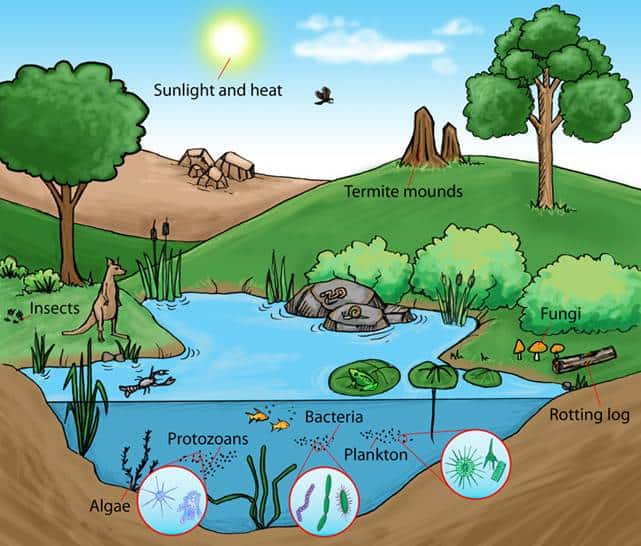
Ecology: The Study of Our Interconnected Natural World

Ecology is the study of the intricate relationships between living organisms and their environments, examining how these interactions shape the world we live in. As we delve deeper into the field of ecology, we come to understand the complex web of life that connects all forms of existence, from the smallest microorganisms to the largest terrestrial mammals. This interconnectedness emphasizes the importance of each organism in maintaining the balance of ecosystems, highlighting that every species has a role to play.
In this article, we will explore the various levels of ecological study, ranging from individual organisms and populations to entire ecosystems. By understanding these levels, we can appreciate both the delicate balance of nature and the profound impact human activities have on the environment. This understanding is crucial in fostering a sense of responsibility toward preserving our natural world, as ecology is the study of the relationships that sustain life itself.
The Levels of Ecological Study
Understanding Individuals
At the most basic level of ecological study, we find individual organisms. Each organism interacts with its environment in unique ways, responding to external factors such as climate, habitat, and availability of resources. By studying individuals, ecologists can gain insights into the adaptations and behaviors that enable survival. For example, the camouflage of a chameleon helps it blend into its environment, while the migratory patterns of birds reveal how species respond to seasonal changes.
Exploring Populations
Moving beyond individuals, populations consist of groups of individuals from the same species living in a specific area. Understanding populations involves studying their size, density, and distribution, which can be influenced by factors such as resource availability and predation. For instance, an increase in food supply can lead to a population surge, while habitat destruction can result in population declines. By analyzing populations, ecologists can track trends and make predictions about species viability and conservation strategies.
Communities: The Interactions of Populations
Communities are formed when different populations interact within a given area. These interactions can be interspecific—between different species—or intraspecific—between individuals of the same species. The dynamics of communities are shaped by various factors, including competition, predation, and symbiosis. For example, the relationship between pollinators and flowering plants showcases mutualism, where both parties benefit from the interaction: plants receive pollination, while pollinators gain food resources.
The Concept of Ecosystems
An ecosystem is a larger ecological unit that encompasses all communities and their physical environments, including nonliving factors like soil, water, and climate. Ecosystems can be categorized as either terrestrial or aquatic, each supporting a unique set of organisms. Understanding ecosystems requires a holistic view of the intricate interactions between biotic and abiotic components. For instance, the destruction of a coral reef ecosystem impacts not only the fish that inhabit it but also the organisms that rely on these fish as a food source.
Land vs. Aquatic Ecosystems
Land Ecosystems
Land ecosystems, such as forests, grasslands, and deserts, are characterized by distinct flora and fauna adapted to specific climatic conditions. Forests, for instance, support a diverse range of species from towering trees to small ground animals, all interacting in complex food webs. Understanding these ecosystems involves studying how energy flows through and is recycled within them, a concept crucial to ecology.
Aquatic Ecosystems
In contrast, aquatic ecosystems encompass various water-based environments, including oceans, lakes, and rivers. Each type of aquatic ecosystem supports unique organisms and features distinct environmental characteristics. Ocean ecosystems, for example, are often characterized by deeper water layers, varying salinity levels, and unique currents, which influence the distribution of marine life. The health of these ecosystems is vital, as they play a significant role in regulating the planet's climate and carbon levels.
The Importance of Interconnectedness
The interconnectedness of life is a foundational principle of ecology. Each species, regardless of its size or role, contributes to the overall health and stability of an ecosystem. For instance, keystone species, like wolves in Yellowstone National Park, have a disproportionate effect on their environments. By regulating the populations of other species, these keystone species help maintain the balance necessary for ecosystem health. Understanding these relationships is essential for conserving biodiversity and ensuring the sustainability of our planet.
Human Impact on Ecosystems
Human activities have profoundly altered ecosystems, often resulting in negative consequences for both natural habitats and human populations. Deforestation, pollution, urbanization, and climate change are pressures that disrupt ecological balance. For instance, pollution can lead to the death of aquatic life and the degradation of water quality, impacting both wildlife and human health. Acknowledging our impact on ecosystems is critical for developing effective conservation strategies that promote ecological resilience.
The Role of Ecologists
Ecologists play a vital role in studying and protecting our natural world. Through a range of research methods—such as field studies, lab experiments, and modeling—ecologists aim to understand ecological systems and the effects of various stresses on them. Their findings inform conservation efforts, environmental policies, and sustainability practices. By elucidating how ecosystems function and the consequences of human activity, ecologists help guide decisions that affect both natural and human systems.
Conclusion: The Future of Ecology
As we navigate the challenges of the 21st century, the importance of ecology cannot be overstated. Understanding the intricate connections within our ecosystems is essential for addressing issues such as climate change and biodiversity loss. The study of ecology is the study of the delicate balance that sustains life on Earth, highlighting the importance of preserving our natural world for future generations. Efforts to promote sustainable practices and restore damaged ecosystems are vital steps toward achieving a more harmonious relationship between human existence and the environment.
Did you find this article helpful? Ecology: The Study of Our Interconnected Natural World See more here Education.
Leave a Reply






Related posts